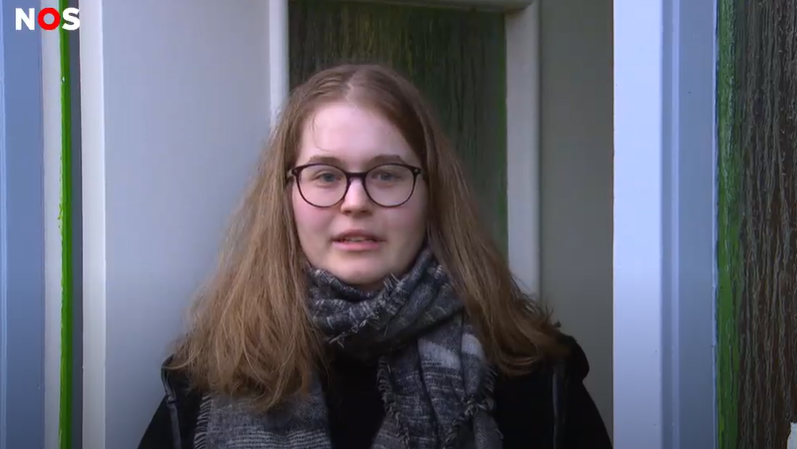UU student: 'students suffering from ill health are on their own'

From Friday, February 18, universities' lecture halls are allowed to be fully occupied once again. One week later, on February 25, face masks will cease to be mandatory on campus. Nadia Buiter, Master's student in Social, Health and Organisational Psychology at Utrecht University, preferred not to watch the press conference in which this announcement was made.
High-risk groups
Commenting on why she is unhappy that the restrictions are being lifted, Nadia declares: “It really upsets me how little consideration is being given to high-risk groups in society. Vulnerable students are basically being told that they're on their own".
Sitting in a lecture hall packed with students not wearing face masks is not an option for her, as she has several chronic illnesses that could be exacerbated by a Covid-19 infection. Aside from pursuing a Master's degree, she is involved with the activism group #GeenDorHout, which calls for more attention to the needs of high-risk groups.
She has been taking online classes for two years, but that hasn't always gone smoothly. She was able to follow certain classes because one of her classmates took a laptop to class. “Even though the university has injected a lot of money into facilitating hybrid classes, lecturers are always properly instructed", Nadia ponders.
“Such mass exclusion of chronically ill students is at odds with the UN Convention on the Rights of Persons with Disabilities”, she adds, stressing that students in ill health are not alone in being adversely affected by the relaxations. Students who live with people in high-risk groups are affected too. “That’s a whole lot of people”, the student concludes. "The least we can do is to keep on using face masks".
Face masks
The Dutch National Students' Association (ISO) has been getting "a lot of signals" that there is a significant amount of students worried about the relaxations. “But the vast majority of them really want to go back to face-to-face teaching. That’s the predominant view”, says board member Gijsbert van Elven.
ISO is pleased with the end of the restrictions to the number of students in lecture halls and that face masks will soon be optional during lectures. “Students don’t like wearing face masks for long periods of time, which makes knowledge transfer difficult”, declares Van Elven.
Many are wondering why face masks will continue to be mandatory in public transport, but educational institutions will be exempt from that rule. But Van Elven is not surprised by the government's decision. “Educational institutions are able to offer vulnerable students a tailor-made solution. And they need to do so”, he says.
He suggests hybrid teaching could be the solution. Universities can also make arrangements so that students would wear a face mask in certain situations. In any case, we're all still advised to wear the mask, notes Van Elven. “I can’t say that all students ought to abide by that, but they certainly need to show understanding for other people’s situation.”
Ventilation
The General Union of Education (AOb) has mixed feelings about the relaxations. “I think that everyone is rather nervous about it”, considers spokesperson Simone van Geest, adding that the union is "very worried" about ventilation. "You only have to walk into a higher education institution to realise that the ventilation isn’t satisfactory”, she declares. That's why the organisation has created a hotline through which people can report ventilation issues.
New normal
AOb expects a significant number of lecturers to go on sick leave, considering the rate of infections. "It is not yet business as usual”, Van Geest concludes. But Nadia Buiter would prefer not to go back to how things were. “We're focusing so much on getting back to ‘normal’, but a lot of people were already excluded at that time. As an example, by no means all university buildings are wheelchair-friendly”, she explains.
ISO suggests that universities could adopt hybrid teaching for good. “For some students, even a train journey can be a challenge, so online classes is a genuine solution for them”, observes Van Elven. However, it is by no means certain that hybrid teaching is here to stay. “It’s going to be a tricky issue”, he predicts.